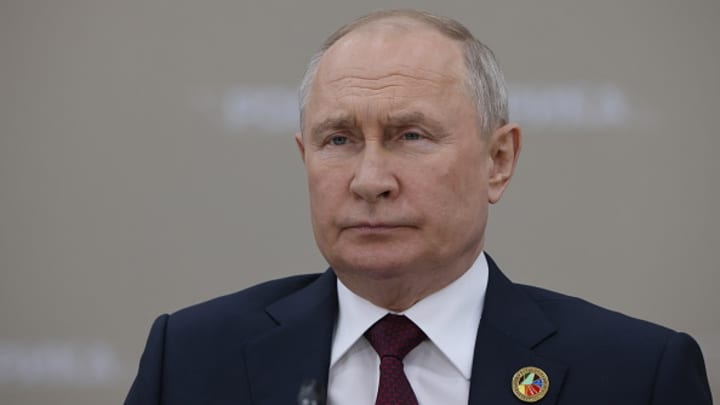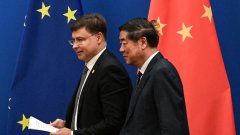
Russian President is weighing whether to attend his first in-person meeting with Western leaders since his in 2022, a Kremlin source tells NBC News.
Putin still hasn't ruled out appearing in person at the G20 meeting of major economies on Sept. 9-10 in the Indian capital, New Delhi, according to a Kremlin official who did not want to be named because he does not make public statements.
The Russian president, facing an election in nine months, would like to relaunch himself on the world stage after a period of relative isolation brought on by the war in Ukraine. Like , he would also be keen to woo countries that aren't solidly in the Western camp at an event closely watched in capitals around the world.
But, in Putin's worldview, it's all about the timing.
Going would come with big risks for a leader used to stage-managed media appearances at home and summits abroad with friendly countries such as Belarus, China and Central Asian states where he rarely faces challenging questions in public. It's a high stakes decision for the embattled Russian leader.
Alexey Maslov, a professor and the director of the Institute of Asian and African Studies at Moscow State University, said the G20 event could be "aggressive toward him politically."
"The media at the G20 will be particularly dedicated to critics of Russia and the main question is whether President Putin will be able to present the Russian point of view," Maslov said. "If he can receive no guarantees, he will only appear online or will cancel his participation altogether."
The Russian leader would almost certainly face awkward questions from journalists, according to Jonathan Eyal, international director of the Royal United Services Institute, a foreign policy think tank in London.
"It's very difficult to edit it out from the carefully scripted TV coverage in Russia, and it creates a fairly dramatic picture for him to sit in a conference room and be directly confronted with the accusations about his war of aggression in Ukraine," he said.
More from NBC News:
These aren't idle worries. In 2014, after Russia's annexation of Crimea, Putin was publicly shunned and sidelined during the G20 meeting in Australia.
Putin, who this year faces the added risk of being confronted over alleged war crimes in Ukraine, had already been pulling back from appearing at international events. Amid the pandemic in 2020 and 2021, he participated in G20 meetings via video conference. He did not participate in the 2022 event in Bali, Indonesia, where other leaders condemned Russia's invasion of its neighbor.
"I don't know. I didn't think about it. We'll see," Putin said in late July when asked about whether he would travel to New Delhi next month, according to the Russian news agency Tass. In March, Kremlin spokesman Dmitry Peskov told journalists to expect an announcement once a decision had been made.
Next month's G20 summit is already set to be the most contentious in years and an important litmus test of many countries' true positions on Ukraine.
In July a two-day meeting of G20 finance ministers ended without the usual joint communiqué due to tense differences over Ukraine. The Indian finance minister, Nirmala Sitharaman, that both Russia and China had objected to a reference to "'immense human suffering."
France has said that stops short of condemning Russia's invasion of Ukraine, like the one issued at the end of last year's G20 summit in Bali did.
An added complication for Putin if he travels outside Russia's borders is an arrest warrant issued by the International Criminal Court on suspicion of committing war crimes in connection with the deportation of Ukrainian children to Russia.
Putin is already missing the BRICS summit of emerging economies in Johannesburg this month, which includes Brazil, Russia, India, China and South Africa, because host nation South Africa would be obliged to arrest him. (South African President Cyril Ramaphosa to arrest his Russian counterpart.)
South Africa is one of the 123 nations that have ratified the Rome Statute that compels them to carry out ICC warrants. India, like Russia and the United States, is not a member.
Andrei Fedorov, Russia's former deputy foreign minister, said there were strong pros and cons to Putin's attending next month's summit, but a big consideration is how other leaders would treat him.
"He doesn't want to be in the situation of sitting together with Western leaders who will just accuse him," Fedorov said. "And some of the leaders, including President Biden, already decided to ignore President Putin and not take any picture with him."
A key element of G20 summits is bilateral meetings with world leaders — invitations to these tete-a-tetes may be a deciding factor for Putin. A number of major G20 countries abstained from a United Nations vote in February calling on Russia to leave Ukraine: Saudi Arabia, South Africa, India and Russia's longtime ally China.
Putin famously greeted Saudi Arabia's crown prince with a high five at the , soon after the killing of Washington Post columnist Jamal Khashoggi. But as far as international diplomacy goes, that was a long time ago.
"Apart from Mr. Modi, the Indian prime minister who would act as a host, or perhaps Xi Jinping of China, it's very difficult to see what other bilateral meetings he is likely to have," Eyal said.
Still, that may not be enough to deter Putin.
"He would like the relations repaired with the West, provided he doesn't have to pay any price for it," Eyal said.




